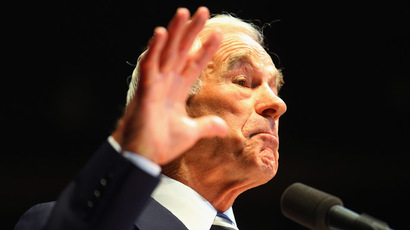Ron Paul on Iraq: ‘The sooner we get out of there the better’
Former congressman Ron Paul told RT on Tuesday that the United States should look to the history books for advice on how to handle the escalating crisis in Iraq and pull the American military out of the country immediately.
US sends arms to Iraq – to solve problems Washington helped create
Only days after US President Barack Obama authorized the Pentagon to begin airstrikes against militants from the Islamic State, formerly ISIS, in the midst of a violent campaign being waged by that group across Iraq, the longtime lawmaker for the state of Texas told RT’s Ameera David that America should abandon its latest efforts in the Middle East lest it wants to repeat the lessons of the last Iraq War.
“I think it’s a little bit late to salvage all the mistakes that we’ve made for the past 24 years,” Paul said. “I’ve been opposed to going into Iraq all the way back to the beginning in 1990 because I believe in nonintervention — that we should mind our own business.
“I don’t think the solution is being involved even more so once again. I’m afraid it will end up with a lot more violence because they are putting more troops in there right now,” the three-time presidential hopeful said in an exclusive interview with RT from his own Texas studio.
Pres. Obama has said before and after authorizing the latest rounds of strikes in Iraq that the US military must not be relied on resolve the fighting between Islamic State militants and Iraqi forces and civilians, and Paul told RT that his own idea of how to handle the situation isn’t too off course from the current commanders in chief’s.
“I think the policy that we should follow is one designed to allow the Iraqis to solve all their problems and stay out of this. Let them deal with it. Because we’ve tried for a long time, we lost a lot of lives, spent a lot of money and allowed a mess to develop, and it’s nothing but a mess and chaos there and in a way we are partially responsible for that.”
Even if the US abandons its efforts, Paul added, assistance provided to other groups throughout the region may end up sabotaging attempts to dismantle the Islamic State if weaponry trickles downs into the hands of militants. Firepower already provided by the Pentagon in and around Iraq has found itself in the wrong hands, Paul said, and the only solution to prevent further unintended consequences is to keep America out of international conflicts altogether.
“I would stick to the basic principle that we have a strong national defense, we defend our national security, we don’t get involved in fights around the world, we don’t get involved in civil strife and civil wars and especially what was going on in the middle east,” he said, “so no, I think the argument stands on its own merits that we shouldn’t be involved in doing this.”
“I think the sooner we get out of there the better,” Paul told David. “We don’t have a moral responsibility; we don’t have a constitutional responsibility. It has nothing to do with our national security. It in jeopardizes our national security and is bankrupting our country.”
What’s more, Paul added, is that the US government’s ongoing meddling in the Iraqi affair and other incidents is falling exactly in line with Al-Qaeda. According to Paul, terrorists have long intended to take the US down by wasting its resources on campaigns, the likes of which have been called fodder for some by further fanning the flames of anti-American sentiments through military action carried out in far apart countries.
“This is exactly what Osama bin Laden wanted,” Paul said. “He wanted to engage us over there because he said, ‘I’ll bring you down like I brought the Soviets down.’ We are doing the same thing because we flat out can’t afford it. It’s a failed policy. I think after so many years and so many decades we ought to admit the truth.”














